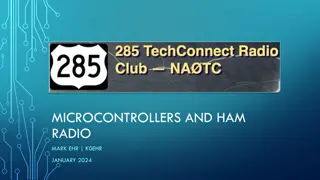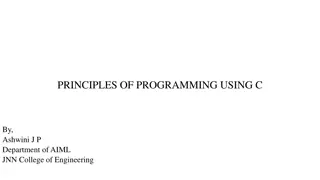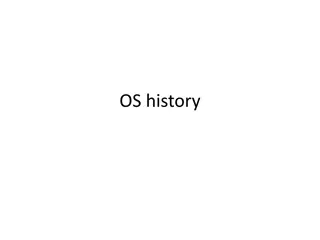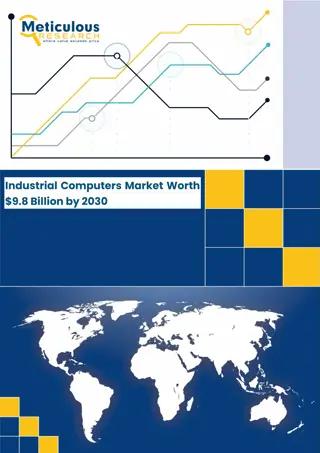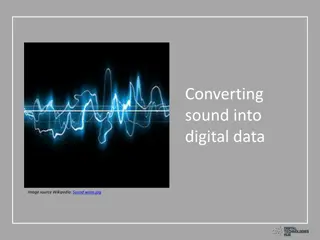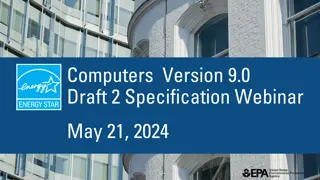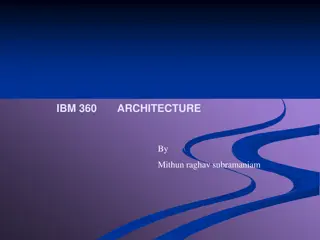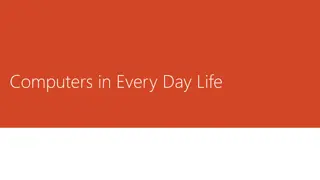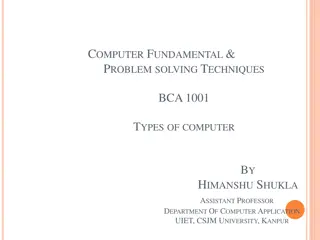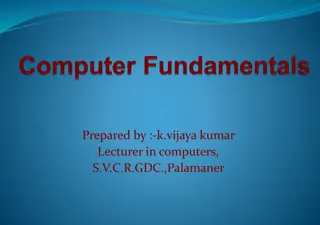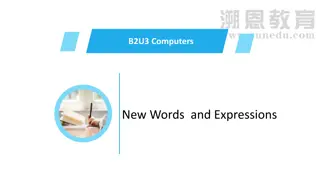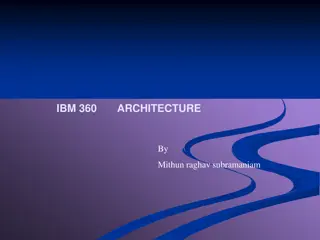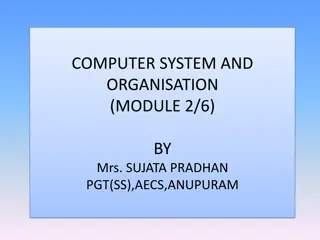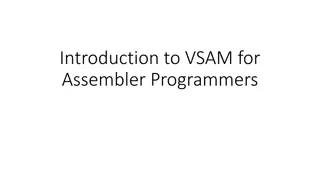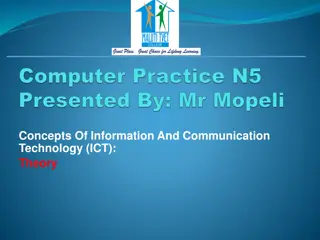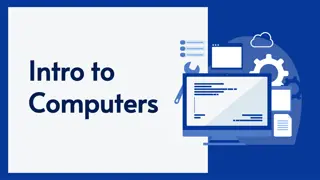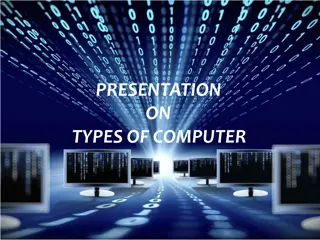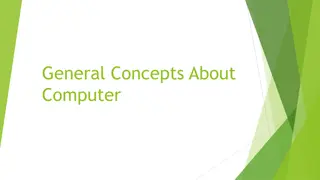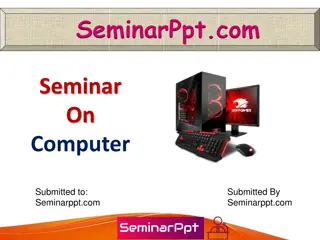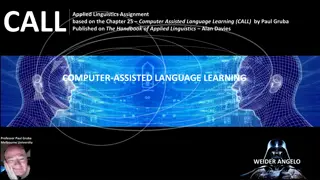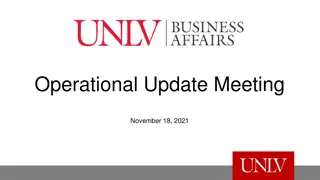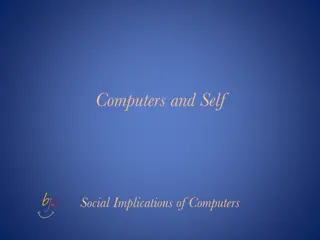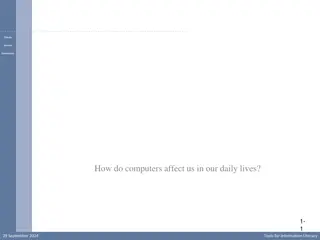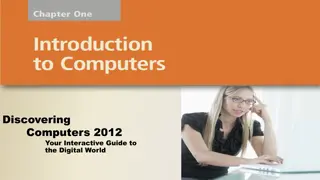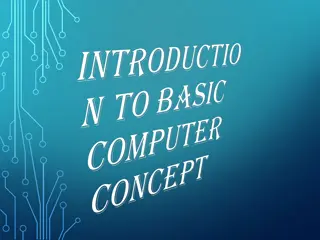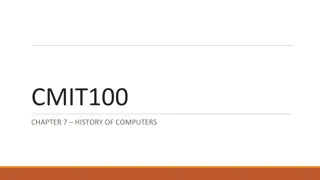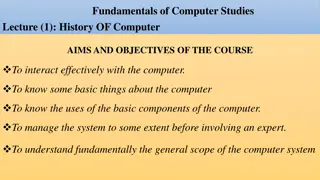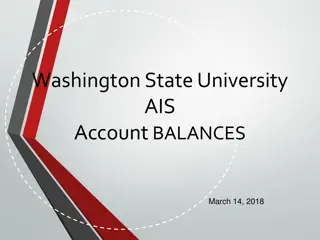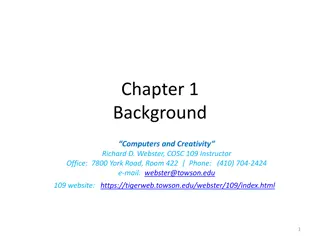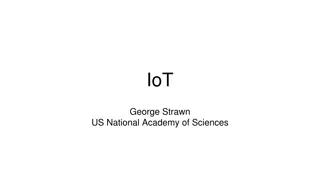Understanding the Evolution of Thin Clients
Explore the evolution and characteristics of thin clients, from their inception as interfaces for mainframe computers to modern ultra-thin clients with enhanced security and cost-effectiveness. Learn about the benefits, such as reduced energy consumption and improved manageability, as well as the tr
4 views • 35 slides
Understanding Microcontrollers and Single Board Computers in Electronics
Explore the world of microcontrollers and single-board computers, from the history of Intel 4004 to the popular Arduino and Raspberry Pi models. Learn the differences between SBMCs and SBCs, major manufacturers like Arduino, Raspberry Pi, and more, and their applications in physical computing, IoT,
0 views • 21 slides
Principles of Programming Using C
Introduction to C programming language, covering topics such as computers, efficient program design, program structures, files, compilers, variables, constants, input/output statements, compiling and executing programs. Characteristics of computers and their operations are also discussed.
5 views • 104 slides
Understanding Technology Concepts for Year 7 Students
Explore essential topics such as Formulas, Cell References, Inputs, Outputs, Web Browsers, Storage, Embedded Computers, ISP, Portable Computers, Hardware Components, Data vs. Information, and more. Enhance your knowledge in the world of technology!
4 views • 4 slides
Essential Factors Affecting Computers' Maintenance
Computers are susceptible to damage from various factors such as heat, dust, water, corrosive liquids, and powerline problems. To ensure optimal performance and longevity, it is crucial to monitor and address these elements to prevent potential harm. Proper maintenance practices like controlling hea
5 views • 14 slides
Evolution of Operating Systems: From Mainframe Computers to Unix
Before the 1950s, users interacted directly with mainframe computers without an operating system, debugging using control panels. The transition to writing programs in symbolic languages led to the need for specific drivers. Run queues and operator-assisted job submissions marked this era. The first
0 views • 41 slides
HQT-6721 Exam Cram: Key Concepts & Practice Questions for Success
\nStart Here: \/\/bit.ly\/3X7ggn5\n\nGet comprehensive details on the HQT-6721 exam guide to ace the Hitachi Vantara Qualified Professional - Enterprise Storage for Mainframe Management certification. Find all the information you need, including HQT-6721 tutorials, practice tests, books, study mater
1 views • 19 slides
Industrial Computers Market Worth $9.8 Billion by 2030
According to this latest publication from Meticulous Research\u00ae, the global industrial computers market is projected to reach $9.8 billion by 2030, at a CAGR of 9.7% from 2023 to 2030.\n
1 views • 5 slides
Understanding the Conversion of Sound to Digital Data with ADC
Sound waves are converted into digital data using an Analog-to-Digital Converter (ADC) to enable computer processing. The ADC captures snapshots of the sound wave at specific intervals, turning them into numerical codes that computers can interpret. The sample rate determines the frequency of these
1 views • 18 slides
Computers Version 9.0 Draft 2 Webinar Specifications
This webinar covers the specifications of Computers Version 9.0 Draft 2, including internal and external power supply requirements, certification criteria, and the ENERGY STAR specification development process. It also discusses definitions, sleep mode details, and internal power supply efficiency r
3 views • 15 slides
Evolution of IBM System/360 Architecture and Instruction Set Architectures
The IBM System/360 (S/360) mainframe computer system family, introduced in 1964, revolutionized computing by offering forward and backward compatibility, a unified instruction set architecture (ISA), and a balance between scientific and business efficiency. The critical elements of this architecture
1 views • 18 slides
The Impact of Computers in Everyday Life
Computers play a vital role in various aspects of our daily lives, from education to business, healthcare, and banking. They help in converting data into meaningful information, enabling digital learning in schools, supporting businesses in marketing and management, aiding doctors in quicker diagnos
0 views • 9 slides
Types of Computers: Supercomputer, Mainframe, Mini, Workstation, Microcomputer
Computers come in various sizes and power ranges, each with unique capabilities. Supercomputers analyze nuclear fission models, mainframe computers have special circuits, mini computers support multi-user environments, workstations offer high processing speed, and microcomputers are affordable perso
0 views • 5 slides
Introduction to Computer Fundamentals: Learn the Basics of Computers
This tutorial covers fundamental concepts of computer hardware, software, and operating systems, explaining how computers process data, generate output, and store information. It explores the advantages of computers, such as high speed, accuracy, storage capacity, diligence, and versatility, essenti
1 views • 11 slides
Introduction to Computers: New Words and Expressions
Explore the fascinating world of computers with new terminology and expressions such as artificial intelligence, technology, exploration, and more. Discover the language surrounding computers and their applications, functions, and development. Enhance your understanding of this technological realm t
1 views • 19 slides
Introduction to Embedded Systems Design
Embedded Systems Design, Chapter 1 provides an insightful overview of embedded systems, distinguishing them from general-purpose computers. The chapter delves into the characteristics of embedded systems, their design considerations, and the various types of embedded computers such as general-purpos
1 views • 7 slides
IBM System/360 Architecture Evolution
The IBM System/360 (S/360) mainframe computer system family, introduced in 1964, revolutionized computing with its forward and backward compatibility, ISA family concept, and efficient integration of scientific and business applications. The critical elements, including compatibility design consider
0 views • 18 slides
Understanding Computer Systems and Organizations
In this module by Mrs. Sujata Pradhan, learn about the characteristics of computers, their basic architecture, and the role of different units and memory types. Explore the classification of computers based on operation and configuration, including digital, analog, hybrid, supercomputers, mainframes
0 views • 13 slides
Understanding VSAM: A Comprehensive Overview for Assembler Programmers
VSAM (Virtual Storage Access Method) is a crucial component in mainframe programming, offering various file types like ESDS, RRDS, and KSDS. VSAM data sets are organized into clusters, control areas, and control intervals for efficient data management. Control intervals and areas are dynamically man
3 views • 26 slides
Understanding Types of Computers in Information and Communication Technology (ICT)
Explore the main types of computers in ICT, including Mainframe Computers, Servers, and Personal Computers such as Desktops, Laptops, and Tablets. Learn about their functions, uses, and distinguishing features to enhance your understanding of ICT.
1 views • 20 slides
Understanding Computers: Key Components and Characteristics
A computer is a programmable electronic device designed to process, store, and retrieve data. This article delves into the key components and characteristics of computers, including hardware, software, data processing, storage, input/output devices, networking, and programming. Computers play essent
0 views • 36 slides
Understanding Different Types of Computers
Explore the classifications of computers based on functionality, size, speed, and cost. Learn about analog, digital, and hybrid computers, their characteristics, and examples. Understand the distinct features and uses of each type in the world of computing.
6 views • 10 slides
Exploring General Concepts About Computers
Computers are electronic devices capable of accepting data, processing it based on instructions, and generating output. They can perform functions like input, processing, output, and storage. This article delves into the basics of what computers are, the difference between data and information, exer
0 views • 15 slides
Evolution of Computers: From Vacuum Tubes to Transistors
The evolution of computers has seen remarkable progress from the era of vacuum tube machines to the introduction of transistors. Starting from massive devices to compact and powerful systems, computers have become an indispensable part of modern life. Explore the generations of computers, their func
0 views • 22 slides
Evolution of Computer-Assisted Language Learning: A Historical Overview
Delve into the evolution of Computer-Assisted Language Learning (CALL) from the mainframe era at Stanford University in the 1960s to the introduction of personal computers in the 1980s and the internet era of the 1990s. Explore key developments, such as the shift from mainframe to PC, the growth of
1 views • 9 slides
Understanding the Computer Fraud and Abuse Act (CFAA) of 1984
The Computer Fraud and Abuse Act (CFAA) of 1984, later amended in 1992, addresses criminal and civil liability for unauthorized access to computers and obtaining information. The law distinguishes between outsiders and insiders who exceed their authorized access. It includes provisions related to na
12 views • 33 slides
Understanding Basic Concepts of Information Technology
Explore fundamental concepts in Information Technology including basic terms, types of computers, hardware, software, and general IT concepts. Learn about different types of computers such as supercomputers, mainframe computers, servers, networked computers, personal computers, laptops, and handheld
1 views • 13 slides
**Operational Update Meeting Highlights - November 2021**
Highlights from the Operational Update Meeting held on November 18, 2021, include discussions on various topics such as Business Affairs, Customer Service Survey, NSHE Legacy Project, and updates from different areas like Human Resources and Financial Services. Important points regarding the NSHE Le
0 views • 34 slides
Migrating APL2 Mainframe to Dyalog APL in Volvo Cars Hercules System
Aplensia AB successfully migrated a 20-year-old VM mainframe APL2 system to Dyalog APL on Windows in the Hercules system used by Volvo Cars. The migration, overseen by Jonas Stensi, Peter Simonsson, and Lars Wentzel, was seamless with no major changes in functionality. Hercules serves as a crucial s
0 views • 39 slides
Implications of Computers on Human Existence and Behavior
Exploring the philosophical debate between free will and predestination, the influence of online personas on real-life identities, the potential for computers to understand us better than ourselves, and the evolving role of humans in an increasingly automated world. These themes delve into the compl
0 views • 6 slides
Evolution of Computers in Daily Life
Computers have significantly transformed our daily routines over the years, from simple tasks like setting alarms to complex operations like online shopping and banking. The progression from basic functions to advanced capabilities has revolutionized how we interact with technology on a day-to-day b
0 views • 36 slides
Evolution of Florida Department of Transportation's Roadway Characteristics Inventory (RCI)
The Florida Department of Transportation's Roadway Characteristics Inventory (RCI) has evolved significantly since its inception in 1975, transitioning from a hierarchical IMS mainframe database to a web-based DB2 relational database in 2004. The RCI system now incorporates features for both Plannin
0 views • 10 slides
Introduction to Discovering Computers: Your Interactive Guide to the Digital World
Delve into the world of computers with "Discovering Computers 2012," exploring basic concepts such as the definition of a computer, its components, importance of computer literacy, and the role of computers in various sectors. Discover the distinctions between system and application software, types
0 views • 38 slides
Special Pricing on Surplus Computers - Dell, Optiplex, iMac, Monitors
Explore a variety of surplus computers including Dell Optiplex GX series, iMac G4 & G5, and monitors at discounted prices. Contact the surplus specialist for availability and grab deals starting from $50. All computers come with essential accessories like keyboard, mouse, and power cord.
0 views • 4 slides
Evolution of Computing: From Abacus to Computers
The history of computing traces back to the invention of tools like the Abacus and Napier's Bone, leading to the development of advanced computing devices such as slide rules and ultimately modern computers. Computers have evolved to become programmable machines that receive input, process data, and
0 views • 7 slides
Evolution of Computers: From Abacus to Personal Computers
Explore the fascinating journey of computers through history, from the invention of the Abacus in 4000 BC to the development of personal computers in the modern era. Learn about the four generations of digital computers, the impact of integrated circuits, shifts in programming languages, and societa
0 views • 17 slides
Fundamentals of Computer Studies: Understanding the Evolution and Importance of Computers
Computer studies cover the history, aims, and objectives of computers, emphasizing their vital role in today's world. The course explores basic computer components, data processing, and the transformation of manual tasks to automated processes. Computers are indispensable tools for efficiency and pr
0 views • 13 slides
WSU AIS Account Balances System Overview
Washington State University's AIS Account Balances system is a legacy mainframe application that provides users with access to query accounting and financial information. Users can request access by completing a form and submitting it to the Controller's Office. The system, developed in the 1980s, c
0 views • 23 slides
Understanding Digital and Analog Information in Computers
Explore the concepts of digital and analog information in computers through examples like thermometers, sound, and sight. Learn how computers process discrete digital data compared to continuous analog information, and why understanding both is essential in digital media courses. Delve into the conv
0 views • 49 slides
Evolution of IT: Three Generations and the Impact of IoT
Understanding the evolution of Information Technology through three generations - from connecting people to computers and information on the internet to the current Internet of Things (IoT) era where computers interact without human intervention. The potential for IoT to connect computers, access in
0 views • 8 slides

